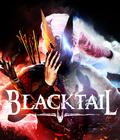We're starting to see more games tackle Eastern European figures of legend and myth, and while the cuts aren't that deep yet, they remain intriguing to those who aren't familiar with the original stories. One such figure is the Baba Yaga, who can range from a trickster with a purpose to a terror of the woods. We took a look at one of these games, Blacktail, a little more than a month ago and were impressed with what we saw then. After checking out the final game, the sentiment hasn't changed.
The story plays out as an alternate origin story to Baba Yaga. There were once two sisters living in a Slavic village, Zora and Yaga. Zora went missing, and Yaga was expelled to the nearby forest, accused of performing witchcraft that resulted in her sister's disappearance. As she goes on a quest to locate her sister, Yaga hears an antagonizing voice from her dreams that turns out to be real. While she is given new abilities as a result of this, she is also forced to confront her own fears to gain the strength to complete her quest.
With a first-person perspective, Blacktail can be best described as an adventure game that isn't always focused on killing. You will be fighting, but you won't be doing so with an extensive library of weapons at your disposal. You have a bow at all times, which comes with more nuance than expected. You can fire it quickly to pull off shots better suited for enemies that are located much closer, or you can pull back as far as you can for more accurate shots that go further. You can't stay prepped for long, as you'll return to a resting position if you don't fire. You'll also end up plucking at the string if you have no arrows, which is a good visual and audio warning and shows off the amount of detail the development team accomplished. Aside from the bow, you have a gauntlet that doesn't necessarily kill as much as it knocks back enemies and breaks down weak barriers. It doesn't take long before you encounter a broom that acts more as a distraction for enemies; they focus on it rather than you for a short while. Defensively, you have a dash ability, and while you can't get very far with it initially, especially since it eats up so much of your stamina, the dash can kill fragile creatures.
When you aren't spending time flinging arrows at enemies and spirits, you'll be involved in lots of crafting. Initially, you'll mostly craft arrows, and you'll do that constantly because the materials for different arrow types are abundant — and you can only hold nine arrows at a time. Shortly after, you'll learn to craft antidotes to combat poisonous spider bites. You'll eventually find other materials like flowers, slime, meat, and teeth to craft more abilities, potions and spells, all of which can initially be done by trekking back to the hut to cook at the cauldron or finding the hut's black cat to warp you there and back if you don't fancy the long trek.
What makes the crafting system interesting is that your ability to discover new spells and potions isn't dependent on leveling up but on finding actual pages in the world. Depending on how focused you are on the main storyline missions, there's a good chance that you'll never get to use many of the spells because you haven't done much exploring to advance the given skill tree. Unless you're absolutely thorough the first time through, you'll definitely use New Game+ to go back and fill in the gaps.
In practice, the combat and crafting systems are an interesting combo because they are often used together. This is especially true of the need to craft arrows, and while the process isn't terribly long since you can craft them in batches if you have the materials, things can get frantic because the crafting menu only slows down the action a tad. It's doable during regular boss fights, but it's dangerous during boss fights if you don't already have arrow crafting committed to muscle memory. Luckily for those who haven't mastered this yet, the game offers the ability to toggle difficulty levels without having to start a new save. You can cheat your way through boss fights if you still want to have a bit of a challenge but not to the point that you can't see the rest of the game.
Governing most of the game is a morality system that performs exactly as expected thanks to its use in countless other games. You set up a given path at the beginning by answering one question, and everything you do either steers you more toward or away from the chosen path. Some of these are simple tasks, like deciding to knock down a beehive or using a flower to distract the bees so you can get honey. Others are more involved, like choosing whether to shoot a bird for its feathers or deciding whether to trick someone who needs help. Some actions can only be done based on that initial choice, and you'll get a different reaction if actions go against your initial alignment.
One of the more interesting parts of the morality system is how it affects your crafting. Depending on your choices, you'll gain access to concoctions that only appear in one path. For example, go good, and you can slow down enemies while giving them gradual damage. Go evil, and the power constantly heals you but lets enemies move around at a normal speed. Like the crafting system and discovery of spell pages, you'll use New Game+ or a completely new save if you really want to see every power.
While the combat is good once you get the hang of crafting on the go and the morality system puts a nice wrinkle on the overall gameplay, there are two elements that act as the hooks to keep players engaged. The first is the forest itself, which hides a ton of nooks and crannies with chests, fights and items. The developers have stated that it'll take over 20 hours to complete the game, and it is believable considering that the main storyline takes over 10 hours to complete. There's the sense that there's always something to do, even if it has no direct benefit. It also helps that the forest is a character, with the hut acting as your hub while sections of the forest represent different seasons. From the lush fields of green to the overcast skies hanging over blankets of snow, there's plenty to capture your attention, even if other games have attempted forest settings like this.
Speaking of characters, that's the other big hook that keeps you playing. While you encounter few humans in the game, the forest is filled with plenty of creatures to interact with. There are quest-giving mushroom groups that point you to all sorts of quests along with other sentient mushrooms that act friendly or antagonizing, depending on your moral alignment. There's a larva that's constantly lost and asking for your help. You also have an ant queen that wants to decimate a nearby human village. There are enough creatures with different personalities that feel fully fleshed out, and finding them all —even by accident — makes the environments more lively.
The presentation in Blacktail is mostly excellent. The environment commands most of your attention, and the immense amount of vegetation coupled with the right amount of lighting is something we don't see often in games. It looks stunning enough to give you the impetus to simply roam around the world. The few humans in the game's cut scenes are fine if you are OK with all of their faces being covered up or otherwise obscured. The other creatures look wonderful, mostly because of how purposefully misshapen they all are. Seeing all of this run at 60fps or more gives the impression that there's still plenty of room left for Unreal Engine 4 games to impress. The music is moody, which fits with the setting and feels right for any situation you're in. The voice work is great, and while the use of English accents is a bit odd for something taking place in a region that isn't England, we've heard it for so long in other games that it isn't too notable of an issue. What's strange is the witch, who has an American accent and uses more modern slang, which feels off considering that no other character in the games does this. Again, it's not a huge thing, but it also isn't so easily ignored.
Steam Deck owners will be glad to see that the game officially got that Verified check from Valve upon release. Checking out the final build, little has changed since we saw the preview build over a month ago. Set to a native 1280x800 with a low preset on, the game runs at 60fps most of the time without taking much of a graphical hit compared to playing it on a more powerful machine. Controls feel snappy, and there's no stuttering. The only drawback thus far is that the game drains a full battery in under two hours, so be prepared to save often if you plan to be away from an outlet or battery pack, especially without too many in-game options to squeeze more energy from the battery.
Blacktail is a welcome surprise for the end of the year. Combat can come off as cruel due to the limited number of arrows and the limited dodge mechanic, but the actual firing of arrows is excellent. Boss fights feel very satisfying once you finally get a read on what they're doing, but the variable difficulty that can be utilized during boss battles can provide some relief if players are more interested in the story than gameplay. The world is the real star thanks to the grimy yet alluring presentation and the cast of characters. The side-scrolling sections after every boss fight act as neat breathers before you return to your adventure. Blacktail is intriguing overall and well worth seeking out if you love adventure games.
Score: 8.0/10
More articles about Blacktail











 In Blacktail, guide Yaga along the path to become a fearsome guardian of the forest or the dark legend that haunts children's nightmares.
In Blacktail, guide Yaga along the path to become a fearsome guardian of the forest or the dark legend that haunts children's nightmares.





































